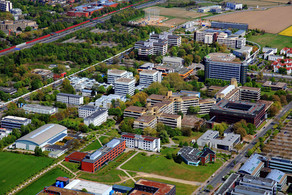University Alliance Ruhr welcomes international materials scientist
- TU News

Established in 2021, the Research Center Future Energy Materials and Systems (RC FEMS) is currently in the set-up phase. Together with three other research centers and one college, it forms the Research Alliance Ruhr, in which the three partner universities of the UA Ruhr combine their top-level research on pressing issues of the future. The goal of the RC FEMS is the targeted, rapid and sustainable development of new materials that are urgently needed for the renewable energy transition. The goal is to understand the fundamental properties and relevant processes in the production and use of complex materials to provide building blocks for the generation, conversion, storage and transport of energy. At the same time, energy-intensive methods for the production and processing of materials are to be replaced by regenerative processes.
Potential for more sustainable and energy-efficient electronic devices
The appointment of Prof. Anna Isaeva is the fifth at the Research Center and her professorship is part of the Experimental Physics research section at TU Dortmund University. The materials scientist investigates the chemistry of quantum materials and aims to decode their structures at the atomic level in order to develop tailor-made quantum materials with unconventional magnetic and electronic properties. These have the potential to be used in a new generation of more sustainable and energy-efficient electronic devices. According to Prof. Isaeva, the wide variety of chemical and structural properties of quantum materials makes their design particularly challenging. With her working group, which incorporates the fields of solid-state chemistry, condensed matter physics and materials science, she will also build on the research of the Department of Physics and draw on its infrastructure.
After studying materials science, Anna Isaeva received her Ph.D. in inorganic chemistry from Moscow State University, Russia, in 2008. She worked as a postdoctoral fellow at the University of Antwerp, Belgium, before moving to TU Dresden in 2010. There, she was a junior professor for “Synthesis and Crystal Growth of Quantum Materials” and a visiting group leader at the Leibniz Institute for Solid State and Materials Research Dresden. Prior to her appointment in the Ruhr region, Isaeva was an associate professor at the Institute of Physics of the University of Amsterdam in the Netherlands.
The 42-year-old scientist is looking forward to the interdisciplinary and inter-university collaboration: “During my first visit to Dortmund and Bochum, I was very impressed by the stimulating and up-to-date environment. Further encounters reinforced this impression. Throughout my academic career, I have come to value the interdisciplinary collaboration and the harmonious interaction between different departments and scientific perspectives. The UA Ruhr and the RC FEMS seem to foster such an approach exceptionally well.”
Research Alliance Ruhr
The Research Alliance Ruhr was initiated as part of the Ruhr Conference of the government of North Rhine-Westphalia to expand the international top-level research of TU Dortmund University, Ruhr University Bochum and the University of Duisburg-Essen, which cooperate in the UA Ruhr. Established in 2021, the research alliance comprises four inter-university research centers entitled “One Health Ruhr”, “Chemical Sciences and Sustainability”, “Trustworthy Data Science and Security” and “Future Energy Materials and Systems”. On top of that, a “College for Social Sciences and Humanities” was also established. The NRW state government is supporting the set-up phase from 2022 to 2025 with a total of 123 million euros.



